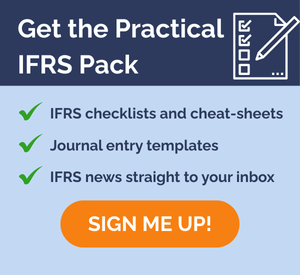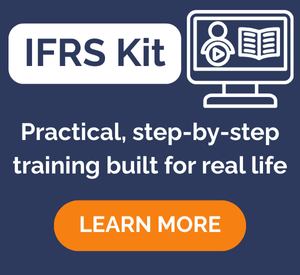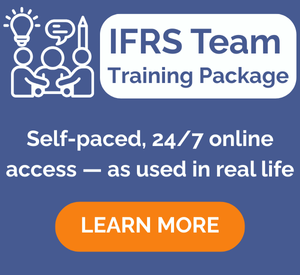How to Learn IFRS (Part 1)
The world has been constantly moving to the single set of global accounting rules. There is a strong ambition to adopt IFRS as a unified set of financial reporting standards all over the planet by 2015. So yes, I understand that accountants and other finance people need to gain at least some degree of IFRS knowledge, since they might face IFRS directly in their job. Maybe it’s also your case.
Now, how to learn IFRS? Where to start?
Well, it depends. First, you should ask yourself at least the following questions:
- What is your current knowledge of IFRS? None at all? Or have you already acquired some base?
- What is your purpose of learning IFRS? How deep knowledge would you like to possess? Do you want to obtain some certificate or “offcial” qualification or just learn it to be able to deal with it in your job?
- What is your budget for learning IFRS? Do you want to keep it free or with minimal financial cost? Or you have a quite generous budget for this?
- How much time are you able or willing to dedicate to your IFRS training? Are you very busy guy and have only evenings / weekends? Or can you afford to skip some days from your daily job and visit classes?
Yes, all this matters, because there are many options what and how to do. So let’s say you are an accountant or financial guy with solid accounting base, but IFRS is something you have heard of but never really touched. There is a certain path to follow no matters tools you chose. Being me in your shoes, I would start my IFRS learning as a step-by-step process:
- Learn the basic structure of IFRS
- Read the Framework
- Get some knowledge about individual standards
- Develop your knowledge and be up-to-date
So let’s start with the first one.
1. Learn the basic structure of IFRS
Familiarize yourself with the basic structure and concept of IFRS. This is not a hard part. To start digging a bit deeper into this complex topic, you should know what is in front of you. Let me draft a simple picture.
IFRS is an acronym for International Financial Reporting Standards and covers full set of principles and rules on accounting treatment of various items or situations. This full set comprises the following components:
- Framework for the Preparation and Presentation of Financial Statements
- International Accounting Standards (IAS) and International Financial Reporting Standards (IFRS)
- Standing Interpretations Committee (SIC) and Interpretations originated from the International Financial Reporting Interpretations Committee (IFRIC)
2. Read the Framework
For any beginner in IFRS, the Framework is the basic concept of IFRS and therefore it is a MUST READ document. Anyway, it’s not so time consuming, as the Framework itself has only about 30 pages and as an experienced accounting professional you would be familiar with many concepts in it. You can find full text of the Framework in www.ifrs.org.
3. Get some knowledge about individual standards
Now while you can read the Framework yourself without any pain, it’s almost impossible and ineffective to read and study the texts of individual standards, interpretations and accompanying docs – it’s more than 3 000 pages!
There are many possibilities how to learn basic principles and rules in individual standards. You might want to pick one of them based on your time and budget available. In my opinion, 2 main streams of learning IFRS are face-to-face training and self-study.
Face-to-face training
What I mean by saying “face-to-face” is attending a classic form of the study: long-term courses in the class, short-term seminars or workshops, etc. This should work wonderfully – I learned most of my IFRS basics this way. Let me just sum up pros and cons of face-to-face training:
Pros:
- learning from experienced tutor with personal contact
- high level of interactivity – you might ask for additional explanations or any questions you don’t understand and often you get a feedback from your tutor
- full focus on the topic – when you attend a lecture, you will not be distracted by so many things around you (like 5 minutes for coffee, 5 minutes for “very tiny help” to your colleague or family member) and therefore, your study will be very effective.
Cons:
- high costs – if you’d like to attend really high-quality training, you will pay for it – oh yeah. I remember that the cost of my 6-day course on IFRS was about 4 000 EUR. Of course, tutor and topics covered were wonderful, however, if cost is something that bothers you, then check out other forms of training.
- time consuming – face-to-face training usually takes place during your normal working or business hours and you must find a space in your overloaded schedule. That might be a problem, especially during a high or busy season.
- inconvenient – you might also suffer from certain form of inconvenience. Often, you have to travel to the location that is far far away from your office or home. Or, you might feel distracted by other attendants in the class.
In the second part of this article, I will give you some hints how to effectively learn IFRS by self-study and what good sources you could use in order to stay up to date with the newest developments.
Want to dive deeper into IFRS? I’ve created the free report “Top 7 IFRS mistakes that you should avoid”. Sign up for email updates, right here, and you’ll get this report as well as 3 free important chapters from my course IFRS In 1 Day.
Tags In
JOIN OUR FREE NEWSLETTER AND GET
report "Top 7 IFRS Mistakes" + free IFRS mini-course
Please check your inbox to confirm your subscription.
13 Comments
Leave a Reply Cancel reply
Recent Comments
- Silvia on What are directly attributable costs?
- Nicola on What are directly attributable costs?
- Antonio on Top 4 Changes in Profit or Loss Statement under IFRS 18 (with video)
- Silvia on IAS 23 Borrowing Costs Explained (2025) + Free Checklist & Video
- Silvia on How to account for financial guarantees under IFRS 9?
Categories
- Accounting Policies and Estimates (14) 14
- Consolidation and Groups (25) 25
- Current Assets (21) 21
- Financial Instruments (56) 56
- Financial Statements (54) 54
- Foreign Currency (9) 9
- IFRS Videos (74) 74
- Insurance (3) 3
- Most popular (6) 6
- Non-current Assets (56) 56
- Other Topics (15) 15
- Provisions and Other Liabilities (46) 46
- Revenue Recognition (27) 27
- Uncategorized (1) 1





Hi Silvia
Learned lot of things from you from your website, I have one question, will appreciate if you can assist on the same:
The developer X has entered into an property development agreement with another company Y who owns the land to CONSTRUCT THE BUILDING ON THE LAND and in return the Developer has agreed to pay the consideration of AED 50 million and 50 fully paid apartments in the building on completion of the project to Y . On completion of the project the land will be automatically transfered to the unit owners as per Joint Property law in the country.
The project is in pipeline and all the construction cost is being capitalaised under Property Under Developement for sales.
How to account for land cost of the project in the books of Developer which includes AED 50 million + 50 units which are yet to be constructed.
Thanks for your time and consideration
the way you explain about ifrs for beginners that is wonderful, i appreciate your efforts . thanxxxxxxxxxxxxx
Dear Silvia,
Should one do DIploma in IFRS first and than ACCA or direct ACCA is best. What is the differnce between ACCA and CIMA.
Thanks,
Ranjeet
Dear Elisha,
interesting question. Well, CIMA is a different qualification from ACCA. They are provided by 2 different organizations. I haven’t done CIMA, but I have done ACCA and I can only recommend it – it’s really well known in the world.CIMA is for management accountants, ACCA is more for financial reporting and accountants.
As fod Diploma in IFRS – it’s done by ACCA and you can do it first, it’s actually a good idea as you will be certified when starting ACCA. Remember, ACCA is a membership and once you finish your studies, you will pay an annual membership fee. I think you should browse the web as many people ask the same question. S.
Silvia,
God sees my mind that i have myriad of thoughts on my mind and each one jostle for prominence.
Top the list i hear u ask ? Why on earth is she doing this? Do we really still have selfless people like you in dis animal called life where we constantly run to chase today?
I have gone through this site and van not help but bless the Name of God as each second passes by, that i stumbled on your profile on linkedn.
Let me tell u , people like u are vert rare but where found you constitute the salt to pple careers.
Thanks and God bless u real good …..
Opeyemi from Nigeria
Dear Opeyemi,
I am touched by your sincere words – thank you! I do the website for many reasons, but the primary driver was the need to help others. When you help and give to others without expecting anything in return, then it will come back to you in some way.
Take care and keep in touch! S.
Silvia, would you help me to put a plan for IFRS self study as a beginner
Hi Omar, you can start right here in this website. If you look to the right column, you’ll see 4 rectangles, so click the first one “Getting started” and go ahead
 S.
S.
If you want to invest some cash, then I’d recommend you one of my premium courses
Great!!!, Silvia. To be honest your website would be more helpful to IFRS lover,I hope so. Keep it up.
Not sure what you mean, man Enjoy!
Enjoy!
This great Sylvia,keep up the good work,I really appreciate,you are the best.
Thank you!
The course is fine.